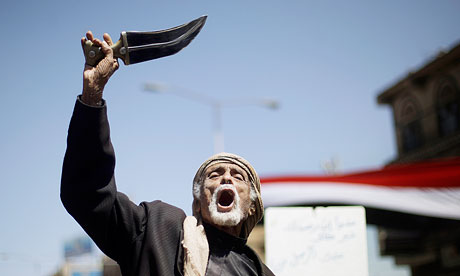
An elderly protester holds up his dagger during a demonstration in Sana'a, Yemen's capital; 98 were wounded, many critically, when the army tried to break up a sit-in at Sana'a University. Photograph: Muhammed Muheisen/AP
The Yemeni government escalated its efforts to stop mass protests yesterday calling for the president's removal, with soldiers firing rubber bullets and tear gas at students camped at a university in the capital during a raid that left at least 98 people wounded, officials said.
The army stormed the Sana'a University campus hours after thousands of inmates rioted at the central prison in the capital, taking a dozen guards hostage and calling for President Ali Abdullah Saleh to step down. At least one prisoner was killed and 80 people were wounded as the guards fought to control the situation, police said.
There have been weeks of protests against against Saleh, inspired by recent uprisings in Egypt and Tunisia that drove out those nations' leaders. Saleh, a key ally of the US in the campaign against al-Qaida, has been in power 32 years. In a sign that the protests are gaining traction, graffiti calling for Saleh to step down surfaced yesterday in his birthplace, the village of Sanhan, for the first time since the protests began.
Students at Sana'a University have been sleeping on campus since mid-February, shortly after the start of the protests against the president.
Health workers, who did not want to be named, said many of the 98 people wounded were in serious condition. Armored vehicles and personnel carriers were seen heading to the area of the university.
"It's a massacre," said the opposition spokesman, Muhammad Qahtan. "It is a crime by security troops against students engaged in a peaceful sit-in."
In the southern port city of Aden, a crowd of women joined a demonstration after a young protester was shot in the head and critically wounded during a rally there the previous day.
Tens of thousands took to the streets in the Ibb province, calling on the government to bring to justice those responsible for a deadly attack there on Sunday. Opposition activists blamed "government thugs" who descended on protesters camped out in a central square: one person was killed in that violence and 53 people were hurt.
Even before Yemen was engulfed by protests, the country was growing increasingly chaotic with a resurgent al-Qaida, a separatist movement in the south and a Shia rebellion occasionally flaring in the north.
Seeking to head off the protests, Saleh called for national dialogue after meetings on Monday with the country's senior political and security chiefs. The state-run news agency said the conference would be held tomorrow and would include thousands of representatives from across Yemen's political spectrum.
But opposition leader Yassin Said Numan said there would be no dialogue unless Saleh agreed to step down by the end of the year.
Saleh's recent pledge not to run for re-election in 2013 has failed to quell the protests.
Fuente: The Guardian
